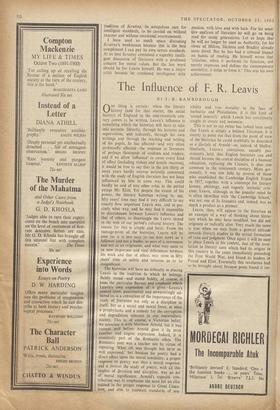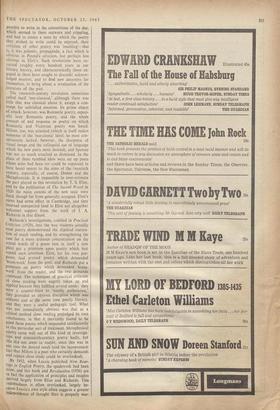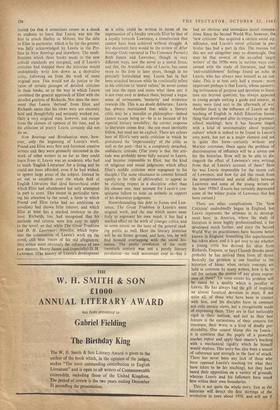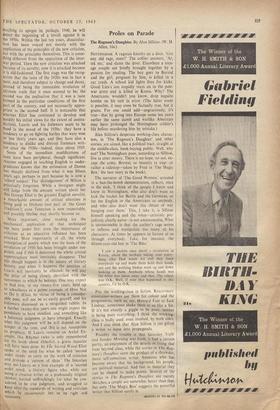The Influence of F. R. Leavis
By J. B. BAMBOROUGH
NE thing is certain: when the literary
O
history (and for that matter, the social history) of England in the mid-twentieth cen- tury comes to be written, Leavis's influence is something which the historian will have to take into account. Directly, through his lectures and supervisions, and indirectly, through his own writings and through the teaching and writing of his pupils, he has affected—and very often profoundly affected—the response to literature of perhaps thousands of students and readers, and if we allow 'influence' to cover every kind of effect (including violent and hostile reaction), it would be true to say that in the last thirty or more years hardly anyone seriously concerned with the study of English literature has not been influenced by him in some way. This could hardly be said of any other critic in the period except Mr. Eliot. Yet despite the extent of his power, the literary historian writing in, say, fifty years' time may find it very difficult to say exactly how important Leavis was, and in pre- cisely what way, and he may find it impossible to discriminate between Leavis's influence and that of others, to disentangle the Leavis strand in the web of our period's cultural history. The reason for this is simple and basic. From the vantage-point of the historian, Leavis will be seen (as it is less easy to see him now) as a follower and not a leader, as part of a movement and not as an originator, and what may seem to us now important and vital differences between his work and that of others may seem in fifty years' time so subtle and tenuous as to be insignificant.
The historian will have no difficulty in placing Leavis in the tradition to which he belongs. Baldly stated—and stated baldly, of course, it loses the particular flavour and emphasis which Leavis's own expression of it gives—Leavis's central tenet, passionately and unwaveringly ad- hered to, is a conviction of the importance of the study of literature not only as a discipline in itself, but as a social and moral force, at once a prophylactic and a remedy for the corruption and degradation inherent in our materialistic society. This is, of course, a Victorian belief; we associate it with Matthew Arnold, but it was current well before Arnold gave it its most familiar and cogent expression. Indeed, it is essentially part of the Romantic ethos. The Romantic poet was a teacher not by virtue of repeating 'What oft was thought but ne'er so well expressed,' but because his poetry had a direct effect upon the moral sensibility; a proper response to poetry was thus a moral response, and a fortiori the study of poetry, with all this implies of devotion and discipline, was an act of moral significance. Arnold's especial con- tribution was to emphasise the need for an elite trained in the proper response to Great Litera- ture, and able to maintain standards of sen-
sibility and true morality in the face of barbarity and Philistinism; it is this kind of 'armed minority' Nvhich Leavis has consistently sought to create and maintain.
This is not to say (what has indeed been said) that Leavis is simply a belated Victorian; it is merely to point out that from the point of view of the historian he, could truthfully be described as a disciple of Arnold—or, indeed, of Shelley. Similarly, Leavis's conviction, equally pas- sionately held, that English literature can and should become the central discipline of a humane education, replacing the Classics, is also one common in the nineteenth century. More ger- manely, it was one held by several of those who established the Cambridge English Tripos in 1917, together with a contempt for literary history, philology, and vaguely `xsthetic' criti- cism..Leavis, although in the popular mind tie is often identified with 'the Cambridge School,' was not one of its founders and, indeed, was as much a product as a pioneer.
Leavis, then, will appear to the historian as an example of a way of thinking about litera- ture which he may have modified, but did not originate or radically alter. Very much the same is true when we turn from a general attitude towards literary studies to the actual formation of taste and judgment. Once again it will be easy to place Leavis in his context, that of the revo- lution in literary taste which had its origins in this country in the years immediately preceding the First World War, and found its leaders in Pound 'and Eliot. Essentially this revolution had to be brought about because poets found it im- possible to write in the conventions of the day, which seemed to them outworn and crippling, and had to create a taste by which the poetry they wished to write could be enjoyed; their criticism of other poetry was 'enabling'—that is, it was polemic, propaganda; a fact which is obvious in Pound's criticism, but perhaps less obvious in Eliot's. Such revolutions have oc- curred roughly every hundred years in our literary history, and characteristically those en- gaged in them have sought to discredit acknow- ledged masters, and to find new ancestors for themselves, to bring about a revaluation of the literature of the past.
The twentieth-century revolution sometimes called itself 'neo-classical,' although there was
little that was classical about it, except a con- tempt for unbridled emotion. Its prime object of attack, however, was Romantic poetry, especi- ally later Romantic poetry, and the whole concept of and response to poetry on which Romantic and Victorian poetry was based.
Milton, too, was attacked (which in itself makes nonsense of the 'neo-classic' label; he most con- spicuously lacked, however, the sharpness of visual image and the colloquial use of language which the new poets most desired), and Spenser was not so much attacked as dismissed. In the place of these tumbled idols were set up poets whose aims had been (or could be supposed to have been) nearer to the aims of the twentieth
century, especially, of course, Donne and the Metaphysicals. It is impossible to over-estimate the part played in this revolution by T. S. Eliot, and by the publication of The Sacred Wood in
1920 the main canons of the new taste were fixed, though far from generally accepted. Eliot's
views had some effect in Cambridge, and they received unexpected (and to Eliot not altogether welcome) support from the work of I. A. Richards in that school.
Richards's investigations, codified in Practical Criticism (1929), into the way students actually
read poetry demonstrated the slipshod inatten- tion of much reading, and by strengthening the case for a more arduous concentration on the actual words of a poem (not in itself a new
plea) put a premium• upon poetry which best repaid such attention. Eliot, for his own pur-
poses, had praised poetry which demanded
'brain-work' from the poet, and Richards•put a premium on poetry which demanded 'brain-
work' from the reader, and the two demands coalesced. The techniques of practical criticism or close reading were eagerly taken up and applied because they fulfilled several needs : they
were a counter-blast to 'woolly wstheticism,' they provided an obvious discipline which was
arduous and at the same time purely literary, and they were a useful pedagogic tool. What was not immediately obvious was that as a critical method close reading prejudged its own conclusions, in that it inevitably found to be good those poems which responded satisfactorily to this particular sort of treatment. Metaphysical poetry came well out of this kind of investiga- tion and nineteenth-century poetry badly, but this did not seem to matter, since this was in any case the desired result (and the inconvenient fact that Milton is a poet who certainly demands and repays close study could be overlooked).
By 1932, when Leavis published New Bear- ings in English Poetry, the spadework had been done, and this book and Revaluation (1936) are in fact the application of principles and insights
derived largely from Eliot and Richards. This indebtedness is often overlooked, largely be- cause Leavis's own style often suggests a greater independence of thought than is properly war-
ranted (so that it sometimes conies as a shock to students to learn that Leavis was not the first to attack Shelley or Milton), but the debt to Eliot in particular, which is by far the greater, was fully acknowledged by Leavis in the Pre- face to New Bearings and elsewhere. The modi- fications which these books made to the new critical standards are marginal, and if Leavis's criticism had stopped there the historian would undoubtedly write him down as a derivative critic, following on from the work of more original men. This would not do justice to the value of certain passages of detailed criticism in these books, or to the way in which Leavis combined the general approach of Eliot with the detailed #nalysis of Richards. Nor does the state- ment that Leavis 'derived' from Eliot and Richards mean that his views were not sincerely held and thoughtfully and seriously worked out. Only a very original man, however, can escape from the climate of opinion of his time, and in his criticism of poetry Leavis certainly did not do so.
New Bearings and Revaluation were, how- ever, only , the beginning of Leavis's work. Pound and Eliot were first and foremost creative writers and they were primarily interested in the work of other writers in so far as they could learn from it; Leavis was an academic who had to teach 'English Literature' for a living and he could not have afforded, even if he had wished, to ignore large areas of the subject. Instead he set out to establish over the whole field of English Literature that ideal hierarchical order which Eliot had adumbrated but only attempted in part to erect. This meant in particular turn- ing his attention to the novel, a form in which Pound and Eliot (who had no ambitions as novelists) had shown little interest, and which Eliot at least has a marked tendency to dis- trust. Richards, too, had recognised that his methods and criteria were less easy -to apply to the novel, so that while The Great Tradition and D. H. Lawrence: Novelist, which repre- sent the culmination of Leavis's work on the novel, still bear traces of his old allegiances, they evince more obviously the influence of two new masters, Henry James and (especially) D. H. Lawrence. (The history of Leavis's development as a critic could be written in terms of the supersession of a loyalty towards Eliot by that of a loyalty towards Lawrence, a transference that cannot have been achieved without struggle. A key document here would be the review of After Strange Gods reprinted in The Common Pursuit.) Both James and Lawrence, though in very different ways, saw the novel as a -moral force, and this, the Arnoldian side of Leavis, has come more to the fore in later years, though in no precisely formulated way. Leavis has in fact been attacked because while he continually refers in his criticism to 'moral values,' he never comes out into the open and states what these are; it is not even easy to deduce them, beyond a vague sense of seriousness, 'maturity' and reverence towards life. This is no doubt deliberate: Leavis has always maintained that while a literary critic may be a moralist or philosopher—indeed cannot escape being so—he is so because of his especial literary sensibility; the correct response to 'literature comes first: the rest must inevitably follow, but need not be explicit. There are echoes here of Eliot's very early criticism in which he postulated the 'impersonality' of the critic as well as the poet—that is, a completely detached, undidactic attitude. (The irony is that this atti- tude was probably never fully natural to Leavis, and became impossible to Eliot; but the kind of religious and social judgments which affect Eliot's middle criticism were repugnant to his disciple.) The same reluctance to commit himself openly to the role of philosopher, to appear to be claiming respect in a discipline other than his chosen one, may account for Leavis's con- spicuous failure to state an wsthetic in support of his draconian judgments.
Notwithstanding this debt to James and Law- rence, The Great Tradition is Leavis's most original work, and the one which seems most truly to represent his own mind; it has had a marked effect on the work of younger critics, and to some extent on the taste of the general read- ing public as well. Here the literary historian will be on firmer ground, and here, too, he will find himself overlapping with the social his- torian. The poetic revolution of the early twentieth century was not a purely literary revolution—no such movement ever is—but it
had no 'obvious and immediate social connota- tions. Since the Second World War, however, the `new criticism' has acquired a certain social sig- nificance, and Leavis's novel criticism in par- ticular has had a part in this. The reasons for this are not altogether easy to disentangle. One may be that several of the so-called 'angry writers' of the 1950s were in various -ways con- cerned with the study of literature, and their `anti-establishment' feelings found an echo in Leavis, who has always seen himself as an out- sider. This is at best only half a reason: more important perhaps is that Leavis, whose unswerv- ing seriousness of purpose and devotion to litera- ture are beyond question, has always appealed to young people seeking a guide and mentor, as many were (and are) in the aftermath of war. Another facet is the influence of Leavis on the teaching of English in Adult Education (some- thing that developed after its impact in grammar- school teaching); here it has become tinged with a kind of sentimentality about 'popular culture' which is indeed to be found in Leavis's own work, but not as a major element and not in quite this form—certainly without any Marxist overtones. Once again the problem of discrimination of influence will be a severe one for the historian. How will he be able to dis- tinguish the effect of Lawrence's own writings from that of Leavis's account of them? How far was Leavis responsible for the recent cult of Lawrence, and how far did this result from the temperamental and social affinity between Lawrence and some of the young writers of the later 1950s? (Leavis has certainly deprecated some of the wilder praise of Lawrence that has been current.)
There are other complications. The 'New Criticism' undoubtedly began in England, but Leavis represents the ultimate in its develop- ment here; in America, where the study of literature is more highly professionalised, it has
developed much further, and since the Second World War its practitioners have become better known in England. Something like superfetation has taken place, and it is not easy to say whether a young critic has derived his ideas from Richards, Empson, or (say) Cleanth Brooks (most probably he has derived them from all three). Basically the problem is one familiar to the historian of Ideas; when certain concepts are held in common by many writers, how is he to tell for certain the source of any given expres- sion of them? To some extent his problem will be eased by a quality which is peculiar to Leavis. He has always had the gift of inspiring an almost fanatical devotion in most, if not quite all, of those who have been in contact with him, and his disciples have in common not only certain views, but' a recognisable mode of expressing them. They are in fact noticeably rigid in their outlook, and just as their best feature is the earnestness of their concern for literature, their worst is a kind of deadly pre- dictability. One cannot blame this on Leavis: it is common that the pupils of a powerful teacher repeat and apply their master's teaching with a mechanical rigidity which he himself would deplore. This unity has also been a source of coherence and strength in the face of attack. There has never been any lack of those who have opposed Leavis's teaching (or what they have taken to be his teaching), but they have based their opposition on a variety of grounds, whereas Leavis and his' followers have stood firm within their own boundaries.
This is not quite the whole story. Just as the historian will detect the first stirrings of the revolution in taste about 1910, and will see it
reaching its apogee in, perhaps, 1940, he will detect the beginning of a revolt against it in ,the 1950s. Within the last ten years, dissatisfac- lion has been voiced not merely with the application of the principles of the new criticism, but with the principles themselves. This is some- thing different from the opposition of the inter- war period. Then the new criticism was attacked because of its novelty; now it is attacked because it is old-fashioned. The first stage was the recog- nition that the taste of the 1920s was in fact a taste, and therefore subject to change and decay, instead of being the immutable revelation of ultimate truth that it once seemed to be; the second was the realisation that it was a taste formed in the particular conditions of the first part of the century, and not necessarily appro- priate to the second half. It is noticeable that whereas Eliot has continued to develop and modify his initial views (to the extent of contra- diction), Leavis and his followers seem to be fixed in the mood of the 1930s: they have a tendency to go, on fighting battles that were won or lost thirty years ago, and they have also a tendency to dislike and distrust literature writ- ten since the 1930s—indeed, since about 1935.
Some of the immediate modifications of taste have been peripheral, though significant. Anyone engaged in teaching English to under- graduates knows that the estimation of Donne has sharply declined from what it was fifteen Years ago, perhaps in part because he is now a , school subject.' The 'dislodgement' of Milton is practically forgotten. While a foreigner might still judge from the amount written about her that George Eliot is the greatest English novelist, a remarkable amount of critical attention is being paid to Dickens (not part of 'the Great Tradition'); even Tennyson is now respectable, and possibly Shelley may shortly become so.
More important, close reading (or the mechanical application of that technique) has been under fire; even the importance of criticism as an educative influence has been attacked. Most importantly of all, the whole conception of poetry which was the basis of the revolution of 1910 has been brought under sus- picion, and if this is destroyed the whole critical superstructure must 'inevitably disappear. That this should happen is in the nature of literary history, and when it happens the position of Leavis will inevitably be affected; he will pay the price of being Closely identified with the movement to which he belongs. One may expect to find him, in say twenty-five years, held up to schoolboys as a prime example of How Not to Do It (Eliot, by virtue of being a consider- able poet, will not be so easily guyed); and his followers dismissed as a misguided rabble. In a further twenty-five years one might expect the Pendulum to have steadied, and something like a balanced judgment to have emerged. Exactly what this judgment will be will depend on the temper of the time, and this is not susceptible to Prophecy. If Leavis remains an Awful Ex- ample, like Rhymer (who is only remembered for his boob about Othello). a grave injustice will have been done. In Ttie Sacred Wood Eliot 'PQke of the need for what he called 'second order minds' to carry on the work of criticism and provide a 'current of ideas' The historian may see Leavis as a true example of a 'second order mind, a literary figure who, while not being a creative writer or a profoundly original thinker, battled unflinchingly for what he con- sidered to be true judgment, and struggled to keep alive the standards of writing and criticism which he passionately felt to be right and necessary.









































 Previous page
Previous page